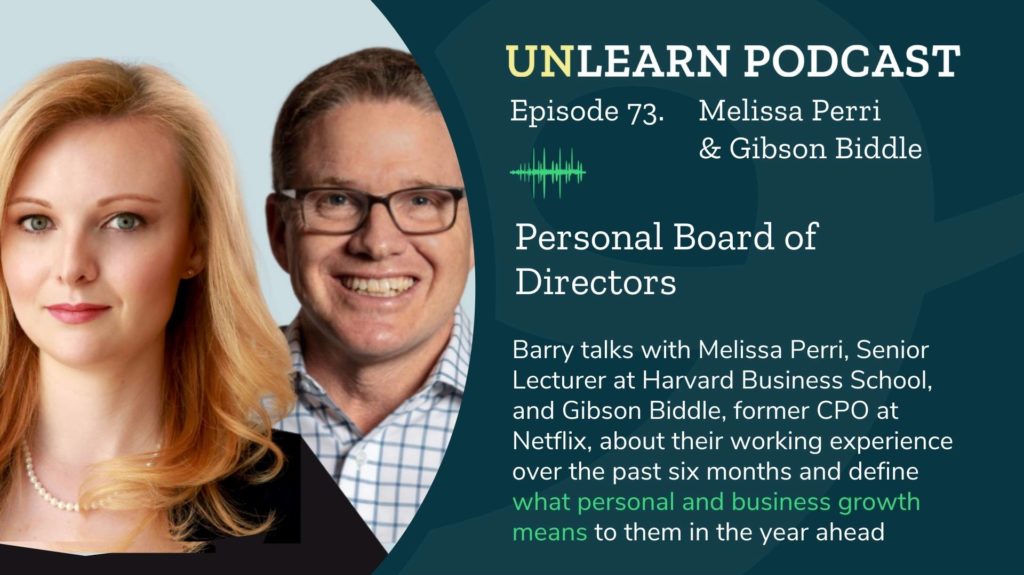Barry O’Reilly welcomes Gibson Biddle and Melissa Perri as this week’s guests on the Unlearn Podcast. Gibson is the former CPO of Netflix; he is also a speaker, teacher, writer, and author of the “Ask Gib” product newsletter. Melissa is Senior Lecturer at Harvard Business School, a member of the Board of Directors at Forsta, and host of the Product Thinking Podcast. In today’s show, Gibson, Melissa and Barry review their working experience over the past six months, discuss progress challenges in the US, and define what personal and business growth means to them in the year ahead. Listen to Personal Board of Directors with Melissa Perri and Gibson Biddle.
Personal Board of Directors: The CAMP Model
The CAMP model, designed by Gibson, is an evaluation of how you feel about the overall quality of your job and career.
- C is about community: do you enjoy working with your boss and your peers at your company? Do you feel a connection to the customers that you serve?
- A is about autonomy: do you feel you have the opportunity to set your own direction?
- M is about mastery: are you learning?
- P is about purpose: do you feel a connection to the work that you’re trying to do? Do you feel like it will help “dent the universe” in some way?
These questions are asked to be answered on a scale of 1 to 10. “I generally want everyone I work with to have an 8, 9, or a 10,” Gibson shares. “I can usually figure out ways to get a 6 or 7 to an 8, eventually.” [Listen from 2:32]

CAMP-S
“I added another letter to the CAMP model,” Melissa admits. “The S is for scale. In the last board of directors meeting, I talked about how I burned out pretty hard during [the pandemic] while I was scaling [my] consultancy, so I’m trying to focus on things that scale, where it’s not me working 24/7.” Barry asks Melissa and Gibson to evaluate their experience over the past 6 months using the CAMP model. [Listen from 7:18]
Listen to Product Thinking for Product Management with Melissa Perri
The HBS Case Method
Melissa talks about her first year doing the case method with her students. Harvard’s case method is an interactive, discussion-focused teaching approach that uses cases about true scenarios that have happened in the past to engage students in problem-solving and decision-making debates. “When the class has a discussion, they can take it anywhere, but as a teacher you have to pull them back a little,” she explains. “You make sure they take the big takeaways, but let them figure it out themselves and surface the ‘aha’ moments.” [Listen from 15:18]
Listen to Delighting Customers in Hard-to-copy Margin-enhancing Ways with Gibson Biddle
How To Take a Break
Gibson and Melissa explore ways to encourage Barry to be more disciplined in taking time off. “What I did last year when I was feeling burnout… [was] use Calendly to block out time,” Melissa says. “I don’t do anything else on Friday unless it’s something I’m gonna get joy out of… Ultimately, it’s about knowing the world’s not going to end if you’re not there.” Gibson talks about how he carves out time. “I tend to ski my age in days each year, and I’m turning 60 this year so that’s 60 days,” he adds. “[Additionally,] I always felt like it’s healthy to take a week off every quarter.” [Listen from 28:53]
Questions About Culture & Autonomy
“You have to work to define, edit and live the values [of a world-class culture] over time; it’s a forever process,” Gibson tells Barry. “Culture is the skills and behaviors you expect from all of your employees. Frankly, the CEO and exec team have to be very invested in [the culture] because they are the role models.” Melissa shares how too much autonomy can hold you back from learning new things. “I felt like I was the only one responsible for my success, and it was never enough.” [Listen from 44:56]















